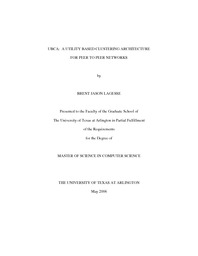
ATTENTION: The works hosted here are being migrated to a new repository that will consolidate resources, improve discoverability, and better show UTA's research impact on the global community. We will update authors as the migration progresses. Please see MavMatrix for more information.
Show simple item record
| dc.contributor.author | Lagesse, Brent | en_US |
| dc.date.accessioned | 2007-08-23T01:56:44Z | |
| dc.date.available | 2007-08-23T01:56:44Z | |
| dc.date.issued | 2007-08-23T01:56:44Z | |
| dc.date.submitted | May 2006 | en_US |
| dc.identifier.other | DISS-1284 | en_US |
| dc.identifier.uri | http://hdl.handle.net/10106/435 | |
| dc.description.abstract | Use of the Peer-to-Peer (P2P) architecture has recently spread in popularity. File sharing and ad hoc networks have contributed to the architecture's usage. P2P generates new challenges in scalability, fairness, and quality of service. Current solutions tend to fall into two main areas: incentives and system design. Incentive-based approaches appeal to the self-interested nature of peers by requiring service to the system in order to access resources. System design includes distributed hash tables and graph-theoretical based designs which have seen some success, but also result in new problems. We introduce a Utility-Based Clustering Architecture, UBCA, designed to address scalability, fairness, quality of service, and load distribution through the use of implicit incentives. The UBCA runs on peers and clusters during the execution based on mutual utility gained as a result of the grouping. Simulation of the UBCA shows improved bandwidth and latency per access and reduced overhead costs. | en_US |
| dc.description.sponsorship | Kumar, Mohan | en_US |
| dc.language.iso | EN | en_US |
| dc.publisher | Computer Science & Engineering | en_US |
| dc.title | UBCA: A Utility Based Clustering Architecture For Peer-to-peer Networks | en_US |
| dc.type | M.S. | en_US |
| dc.contributor.committeeChair | Kumar, Mohan | en_US |
| dc.degree.department | Computer Science & Engineering | en_US |
| dc.degree.discipline | Computer Science & Engineering | en_US |
| dc.degree.grantor | University of Texas at Arlington | en_US |
| dc.degree.level | masters | en_US |
| dc.degree.name | M.S. | en_US |
| dc.identifier.externalLink | https://www.uta.edu/ra/real/editprofile.php?onlyview=1&pid=194 | |
| dc.identifier.externalLinkDescription | Link to Research Profiles | |
Files in this item
- Name:
- umi-uta-1284.pdf
- Size:
- 602.7Kb
- Format:
- PDF
This item appears in the following Collection(s)
Show simple item record


